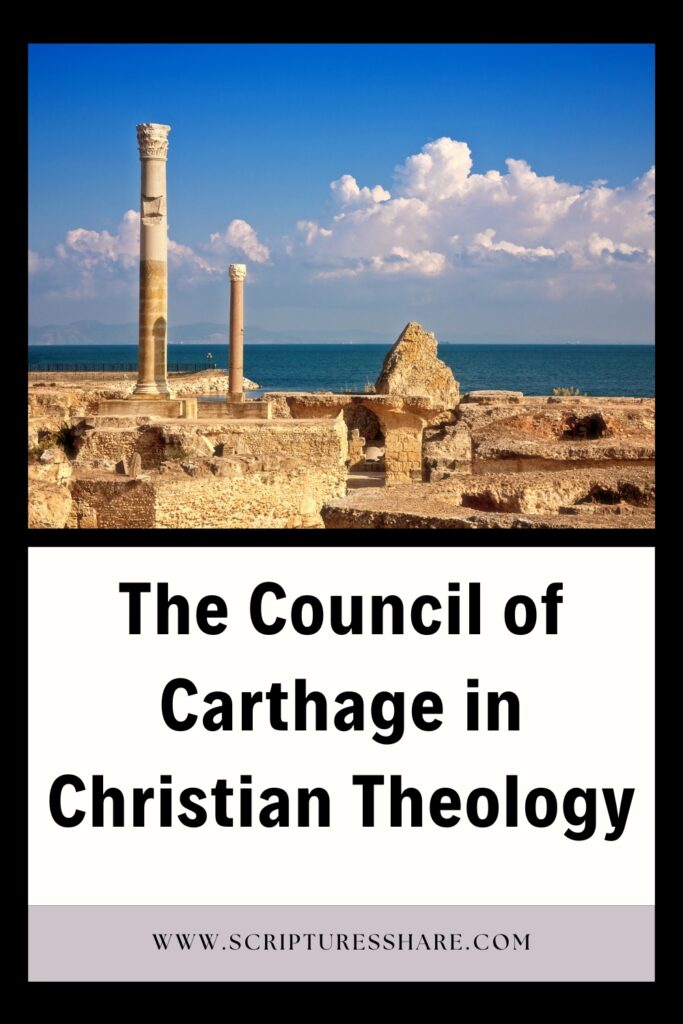No products in the cart.
What is the significance of the Council of Carthage in Christian theology?
This post contains paid and/or affiliate links. I make a small commission at no extra cost to you. Please see our Privacy Policy.
The Council of Carthage is key in Christian theology. It happened in AD 397. This event is a big deal in Christian history.
At this meeting, a list of Bible books was made. It included the New Testament’s 27 books and the Old Testament’s 39 books.
But, the Council of Carthage also added some Apocrypha books. These books are seen as inspired by some, but not by all. This has caused debates about the Council’s decisions, compared to other councils like Laodicea.
Let’s dive into the Councils of Carthage and their role in Christian theology. We’ll see how they shaped Christian beliefs and practices. And, we’ll look at their lasting impact on orthodox Christian beliefs.
The Role of the Councils of Carthage in Christian Theology
The Councils of Carthage were held in the 3rd, 4th, and 5th centuries. They were in Carthage. These councils were important for Christian theology.
They tackled issues like how to treat apostates and the validity of heretical baptisms. Their decisions affected the African Church and the wider Christian world.
The Council of Carthage in 397 made a big impact. They compiled canons, including the Bible’s accepted books. This helped set the Bible’s boundaries. Their decisions helped keep Christian beliefs pure.
Biblical Canon Comparison (Chart)
| Council | New Testament Books | Old Testament Books | Apocrypha Included? |
|---|---|---|---|
| Council of Laodicea (363) | 26 (excluded Revelation) | 39 (Protestant OT) | No |
| Council of Carthage (397) | 27 (all current NT books) | 39 + Apocrypha | Yes |
| Council of Trent (1546) | 27 | 46 (Catholic OT) | Yes (Deuterocanonical) |
This standardization helped prevent doctrinal confusion and preserved the integrity of Christian teaching.
“All Scripture is breathed out by God and profitable for teaching, for reproof, for correction, and for training in righteousness.”
— 2 Timothy 3:16 (ESV)

The Influence of the Council of Carthage on Christian Beliefs
The Council of Carthage’s decisions had far-reaching effects:
Establishment of the Biblical Canon
The council’s list of accepted books became the basis for the Christian Bible as known today.
It resolved disputes over contested books like Revelation, Hebrews, and the Apocrypha.
Church Discipline and Doctrine
The council ruled on valid baptisms, ensuring uniformity in sacramental practice.
It provided guidelines for repentant apostates, balancing mercy with doctrinal integrity.
Theological Legacy
The council’s decisions influenced later Church councils, including the Council of Trent (1546), which reaffirmed the Apocrypha for Catholic doctrine.
“So then, brothers, stand firm and hold to the traditions that you were taught by us, either by our spoken word or by our letter.”
— 2 Thessalonians 2:15 (ESV)
Conclusion: The Lasting Impact of the Council of Carthage
The Council of Carthage (AD 397) remains a cornerstone of Christian theology. By defining the biblical canon and addressing critical doctrinal issues, it helped preserve orthodoxy and shape the future of the Church.
While debates continue over the Apocrypha’s inclusion, the council’s decisions provided a unified scriptural foundation that endures to this day. Its influence can be seen in:
The structure of the modern Bible
The doctrinal standards of major Christian traditions
The historical development of Church authority
As we reflect on this pivotal moment in Church history, we are reminded of the importance of guarding sound doctrine while remaining rooted in Scripture.
“Beloved, although I was very eager to write to you about our common salvation, I found it necessary to write appealing to you to contend for the faith that was once for all delivered to the saints.”
— Jude 1:3 (ESV)
FAQ
What is the significance of the Council of Carthage in Christian theology?
The Council of Carthage in AD 397 was a major event. It listed the Bible’s accepted books. This council’s decisions greatly shaped Christian beliefs and practices.
What issues did the Councils of Carthage address?
The Councils of Carthage tackled many topics. They discussed how to treat those who left the faith and the validity of heretical baptisms. These discussions had a big impact on the African Church and Christianity worldwide.
What was the outcome of the Council of Carthage in 397?
The Council of Carthage in 397 was significant. It created the Bible’s accepted books. This set the Bible’s boundaries. The council’s decisions helped shape how we understand scripture today.
Did the Council of Carthage influence Christian beliefs and practices?
Yes, the Council of Carthage had a big impact. It set the Bible’s accepted books. It also discussed how to deal with those who left the faith. These decisions helped keep Christian beliefs strong.
Why is the Council of Carthage influential in Christian theology?
The Council of Carthage is of great importance in Christian theology. It helped create the Bible’s accepted books. Its decisions shaped the African Church and Christianity as a whole. Despite debates, it remains a key part of Christian history.











